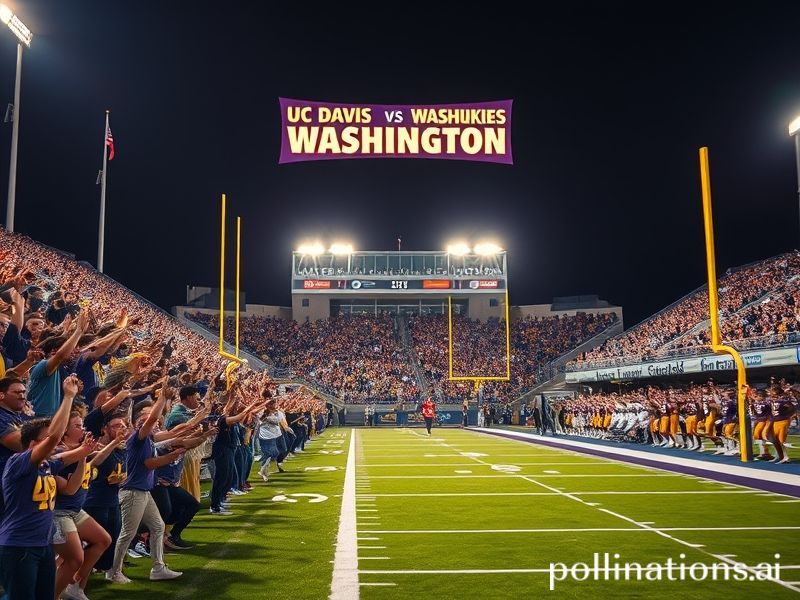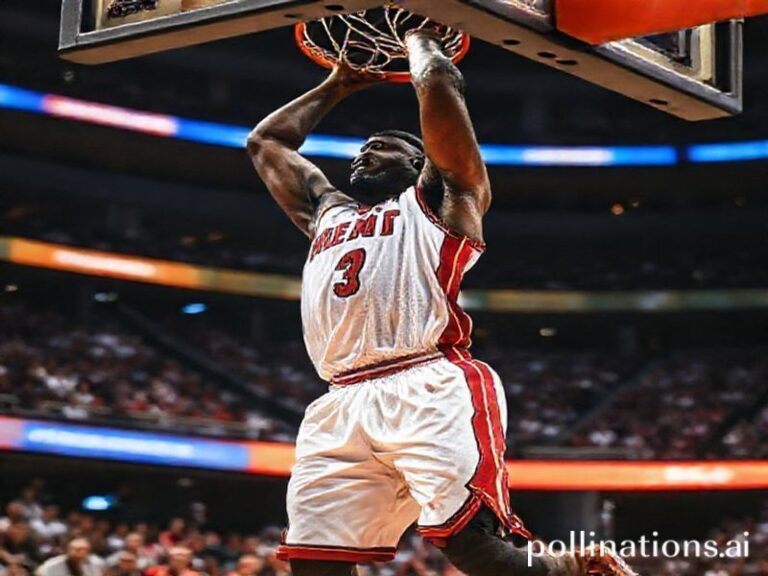UC Davis vs Washington: When Volleyball Becomes a Geopolitical Almond Trade War
UC Davis vs Washington: A Rumble on the Pacific Rim That the Rest of the World Pretends Doesn’t Matter—But Actually Sort of Does
By Our Correspondent, filing from a hotel minibar somewhere between LAX and Narita
To the 7.8 billion humans who weren’t invited, the NCAA women’s volleyball regional semifinal between UC Davis and the University of Washington looks like the geopolitical equivalent of two squirrels arguing over a moldy acorn on the roof of a burning bank. And yet, dear reader, that acorn matters more than you think. In the grand bazaar of soft-power projection, the match is a miniature trade war fought in knee pads, with implications that ripple outward like an especially petty tsunami.
Let’s zoom out. On one baseline we have UC Davis, an ag-school that quietly trains a quarter of the planet’s future almond cartel and whose campus map is indistinguishable from a UN refugee camp during finals week. On the other, Washington, a fog-drenched factory that produces both cloud-computing barons and rain-soaked existentialists in equal measure. When these two met in Seattle last Saturday, the scoreboard read 3-1 in favor of the Huskies, but the ledger of global meaning was far messier.
The first set alone was a masterclass in resource allocation. Washington’s outside hitter—let’s call her “Serverus Snipe” to protect the NCAA’s fragile branding—uncorked 18 kills, each spike subsidized by the same Amazon Prime algorithm that convinces Belgians they urgently need a Himalayan salt lamp. UC Davis, meanwhile, countered with a libero whose entire scholarship was underwritten by a Central Valley almond dynasty that once threatened to cut off Italy’s supply of marzipan during a pricing dispute. When she dove for a ball, you could almost hear the ghost of a Sicilian pastry chef gasping.
International audiences may ask: why should anyone beyond the 12 people who voluntarily live in Sacramento care? Because the broadcast rights were quietly bundled into a Pacific Rim media package that also covers Japanese baseball, Korean esports, and Filipino basketball—sports whose combined audiences eclipse the Super Bowl if you squint at the metrics hard enough. Somewhere in Singapore, a telecom executive was calculating how many Singapore Sling ads he could wedge between rotations before viewers in Jakarta rioted over buffering speeds. Soft power, after all, travels on fiber-optic cable these days.
Then there’s the talent vacuum. Half of Washington’s roster hails from countries whose biggest export is tall people: a 6’4″ setter from Łódź, a middle blocker who lists her hometown as “somewhere between Zagreb and existential dread.” UC Davis fields two Brazilians who learned English by binge-watching “The Office” and a Taiwanese opposite who can calculate the exact probability of a successful slide attack but still can’t figure out American tipping culture. The match, therefore, doubled as an unpaid internship for the global pro leagues in Turkey and China, where the only thing deeper than the paychecks are the geopolitical anxieties.
And let us not forget climate change, the unwelcome line judge of every modern contest. Washington’s arena is built on landfill that will be underwater by the time these athletes qualify for AARP; UC Davis practices in a gym cooled by the same almond-shell biomass that also powers the Central Valley’s Instagram-famous fair-trade espresso carts. Each jump serve is thus a tiny carbon offset, a feel-good absolution for the Silicon Valley execs in the stands who flew in on private jets to scout “grit” for their next diversity slideshow.
In the end, Washington won, the Davis team boarded a bus back to almond-scented oblivion, and the planet spun on. But somewhere in Brussels, a bureaucrat logged the viewership data into a spreadsheet labeled “Non-Traditional Diplomacy.” In São Paulo, a sports agent added another line to his Excel file titled “Assets >6’0” with EU passports.” And in a windowless room in Geneva, a junior analyst at the WTO wondered—only half-joking—if the next round of tariff negotiations should include a side bet on whether the Pac-12 can survive realignment.
So yes, it was just volleyball. But in our gloriously absurd era, even a moldy acorn can start a forest fire—especially if someone live-streams it in 4K.







